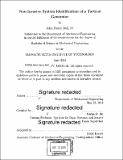Non-invasive system identification of a tactical generator
Author(s)
Bell, John Harry, IV
DownloadFull printable version (5.283Mb)
Other Contributors
Massachusetts Institute of Technology. Department of Mechanical Engineering.
Advisor
Marija D. Ilic.
Terms of use
Metadata
Show full item recordAbstract
Microgrids, small power distribution networks, are gaining traction as an approach to increasing the fuel efficiency of tactical operations. In order to design controllers for microgrids, accurate models of the generators providing power are needed. In this thesis, non-invasive experimental methods for determining synchronous machine system parameters for a Tactical Quiet Generator (TQG), a generator commonly used by the US military, are explored. While the generator's rotor is at standstill, direct voltage excitation over a large range of excitation frequencies of a synchronous machine's stator is employed to determine electrical parameters for the synchronous machine. With the generator in running, the response of the frequency of generated AC power to a step in load is employed to determine the inertia of the generator's rotor. The stator excitation test is performed with the rotor positioned at a series of angles relative to the stator, so as to determine the location of the principal axes (d and q axes) of the rotor and impedances of the synchronous machine as seen in the d-q reference frame. Least-squares curve fitting is applied to the Bode plots of these impedances to fit the predictions of equivalent circuit models to the data, thus determining the model parameters represented by each equivalent circuit element. For the load step response test, the swing equation is used to calculate the system inertia from measured changes in frequency due to known steps in power. From execution of these techniques, it was determined that they are viable methods for estimating system parameters, though greater precision needs to be exercised in the stator excitation test in order to accurately estimate parameters.
Description
Thesis: S.B., Massachusetts Institute of Technology, Department of Mechanical Engineering, 2018. Cataloged from PDF version of thesis. Includes bibliographical references (pages 57-58).
Date issued
2018Department
Massachusetts Institute of Technology. Department of Mechanical EngineeringPublisher
Massachusetts Institute of Technology
Keywords
Mechanical Engineering.